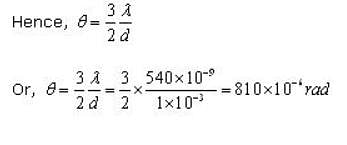Test: Wave Optics- 1 (March 4) - NEET MCQ
10 Questions MCQ Test - Test: Wave Optics- 1 (March 4)
| 1 Crore+ students have signed up on EduRev. Have you? Download the App |
In a single slit experiment, suppose the slit width is equal to the wavelength of light used, then:
Light of wavelength 500 nm is incident on a slit of width 0.1 mm. The width of the central bright line on the screen is 2m. What is the distance of the screen?
The phenomenon of diffraction can take place in sound waves?
What is the angular spread of the first minimum and the central maximum when diffraction is observed with 540 nm light through a slit of width 1mm?
The change in the diffraction pattern of a single slit, when the monochromatic source of light is replaced by a source of white light will be:
In the diffraction of a single slit experiment, if the slit width is half then the width of the central maxima will be:
Which of the following undergoes the largest diffraction?


















